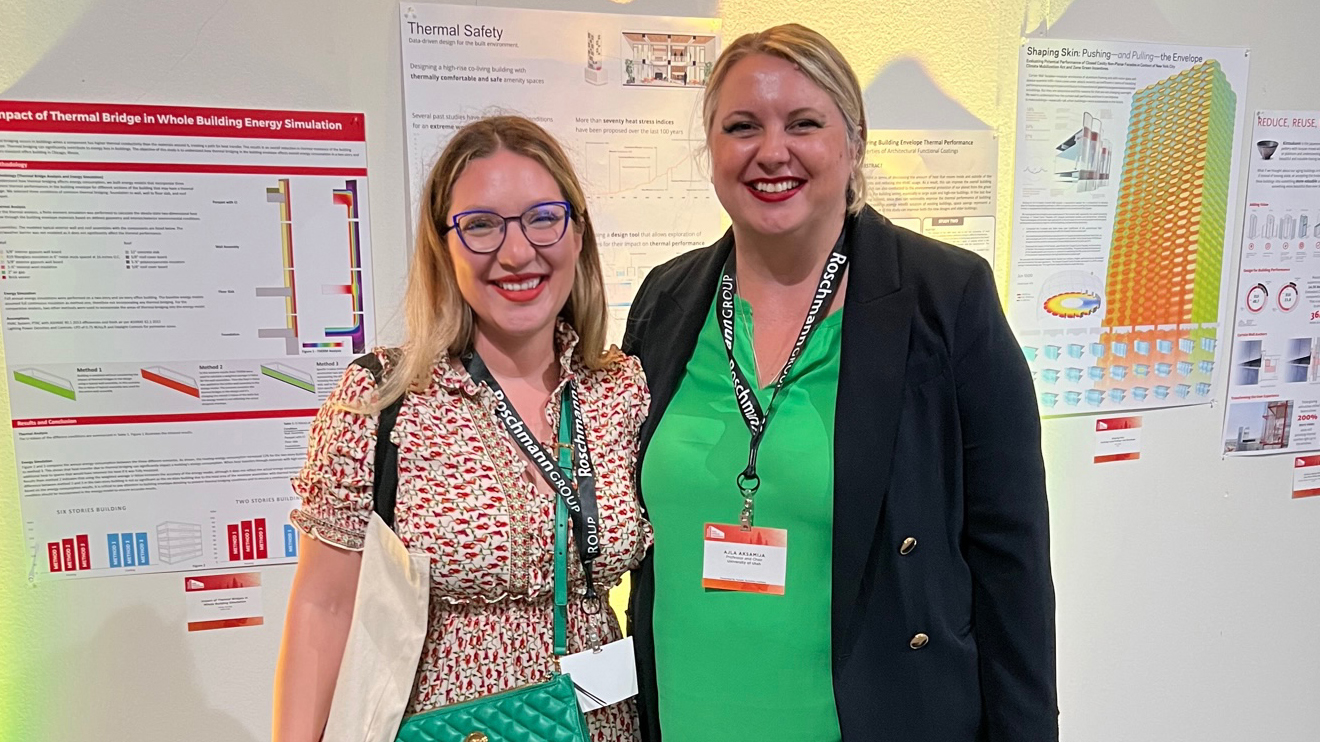
Professor Ajla Akšamija and Associate Instructor Sunny Milosević presented research papers at the Facade Tectonics Institute (FTI) World Congress in Los Angeles on October 12 and 13.
Professor Aksamija presented a paper “Novel Active Facade Systems and Their Energy Performance in Commercial Buildings: Impact of Thermoelectric Materials on Heating and Cooling in Different Climates.” This paper discusses the results of a research study that focuses on understanding the energy performance of novel facade systems that integrate thermoelectric materials (TEs). TEs are active materials that can produce a temperature gradient when electricity is applied or can generate a voltage when exposed to a temperature gradient. The study considered a commercial office building and analyzed the integration of these novel facade systems to provide localized heating and cooling. The main objective of the study was to compare the energy performance of these novel facades to conventional HVAC systems. Simulations were performed for fifteen climate zones in the U.S., investigating energy performance in various weather conditions. Simulation results showed that the energy consumption of a commercial office with integrated thermoelectric facades would be lower than the conventional HVAC system for all climate zones, with higher energy savings in colder climates.
Associate Instructor and Ph.D. student Sunny Milosević presented “Sustainable Retrofit Strategies for an Existing Laboratory Building: Analysis of Building Performance.” This paper analyzes sustainable retrofit strategies for an existing research laboratory building, located in a cold climate. Research methods included archival research, simulations and modeling, and comparison between simulated and actual energy consumption data. This information was used to develop a performance baseline and to account for any difference between simulated and actual energy usage of the original building design. Results were then used to determine retrofit strategies, striving to achieve sustainable and high-performance design solutions. The proposed design solutions were then also simulated using the same sequence of simulation software, and quantitative results were compared to quantify percentages of improvement from existing to retrofit conditions.
The team also presented a collaborative research project, conducted with Dr. Helen Sanders and Alexandra Blakeslee from Technoform, “Condensation Study of Windows: Comparative Analysis of Different Window Systems under Various Exterior Conditions.” This collaborative research project between an academic institution and an industry partner focused on understanding condensation potential in window systems, in relation to different material properties and environmental conditions. The study utilized heat transfer simulations to investigate thermal performance and the potential for condensation, where windows systems with different heat transfer coefficients (U-factors) and Condensation Resistance (CR) ratings were investigated. Simulations evaluated 11 different window systems of various performances under varying environmental conditions, with a total data set of almost 600 simulations. Results indicate that the conditions under which condensation initiates, and the extent of condensation on window surfaces are driven by the individualized performance of each window component and their material properties, rather than solely the U-factor or the CR value. Window systems with similar CR values performed drastically differently from each other, in terms of the extent of condensation under identical environmental conditions. This is attributed to differences in the material properties of their individual components and identifies a major shortcoming with the CR rating.
Lastly, Professor Akšamija’s books were included as part of the FTI’s “Book Nook,” the first time that the World Congress featured book publications.
